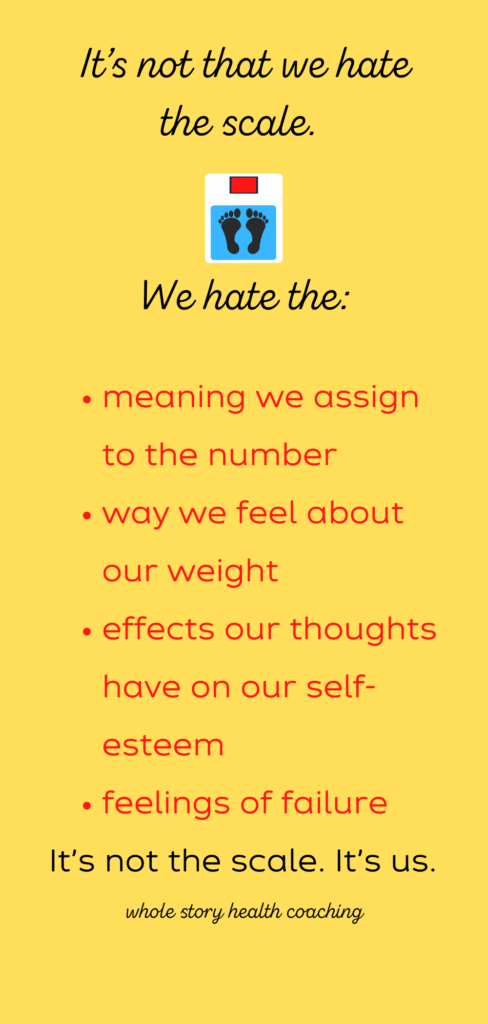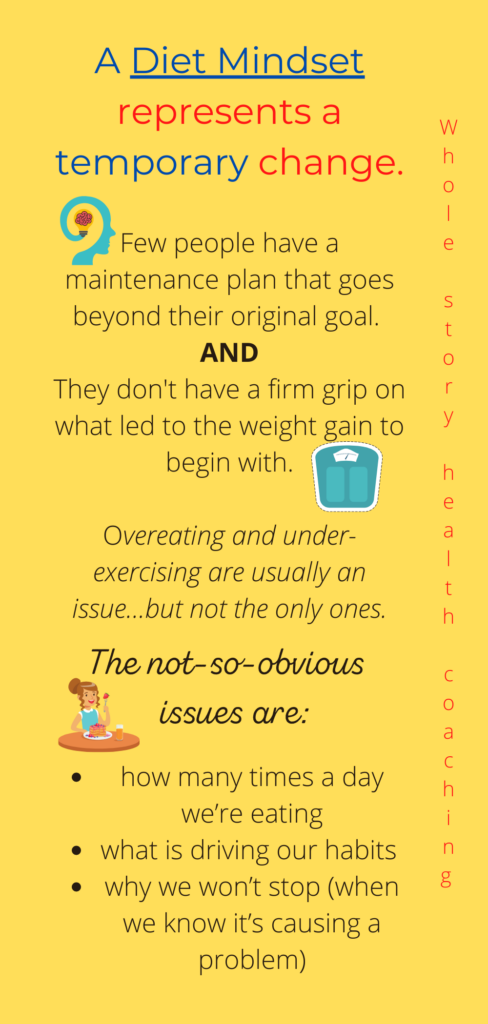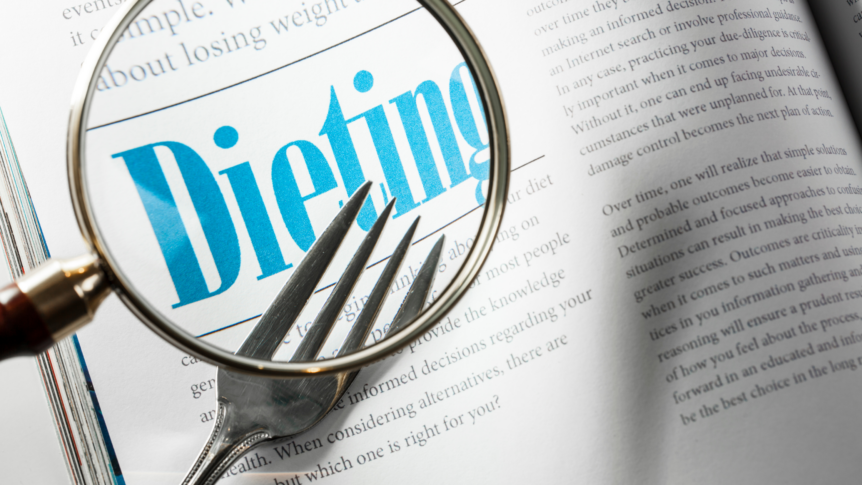Finally, after over 25 years of challenges, I have successfully been able to keep the weight off for the last (almost) 6 years.
It has not been easy.
The key was in recognizing that I needed to make quite a few inner changes to tackle my outer struggles.
Prior to that, I had always gone for the quick fix or methods that were just not sustainable in the long run.
Despite the letdowns, my earlier failed attempts were valuable.
I learned a lot about myself, my obstacles, and what does NOT work for me.
Thanks to that knowledge, I have established a lifestyle and approach that I can live and thrive with.

Before I Knew Better
After my first ever successful attempt to lose weight, I remember feeling so proud of myself.
I couldn’t begin to imagine gaining that weight back—and, I was almost smug about what I had achieved.
But, I did gain it back…plus some.
What happened?
In a word…life. I went back to living the way I always had.
Slowly, I reintegrated the same habits and behaviors that caused me to struggle with my weight.
I didn’t understand that I needed to make permanent changes to my lifestyle, not just temporary adjustments to move the scale.

Keeping the Weight Off is Hard
At the time, weight maintenance wasn’t something that people talked about. It was weight loss.
And though it has been years, I still see the same thought patterns.
There are tons of plans, advice, coaches, and supplements for quick results and transformations, but so few that address how to keep the weight off beyond the initial goal.
In my case, long term weight maintenance was something I simply hadn’t given any thought to.
Slowly, I started to relax— and little by little, I found myself gaining the weight back.
By the time I was up 40 pounds over a weight I never thought I would see again, I was confused about what happened.
Now, I understand that instead of thinking in the long term, my only concern was getting to the destination, not what would happen once I got there.
Unfortunately, this is where many people find themselves and the results can be devastating for our psyches.
We end up feeling like a failure every time we successfully take the weight off, but are not able to maintain that weight loss.

Getting Started
Because weight loss is about more than just shedding fat or looking better, we have to approach it from the various angles involved, for example:
- physical activity (not just exercising)
- relationships with food
- mental and emotional factors
- sleep
As you can see from the list above, we have a lot to cover. For now, these first three areas are some of the most important.
1. Develop a healthy relationship with the scale
I cannot count the number of times I’ve heard how someone hates the scale—or is afraid to weigh themselves.
Trust me, I get it. I was obsessed with getting on the scale several times a day. It was like my life depended on it.
At one point, my self-worth was so tied to the number on the scale, I was disgusted with myself when I couldn’t get to or maintain a certain weight.
Finally, I stopped getting on at all—and gained 25 pounds.
It’s not that we hate the scale. We hate the:
- meaning we assign to the number
- way we feel about our weight
- effect our thoughts have on our self-esteem
- feelings of failure
It’s not the scale. It’s us.
Ups and Downs of Weight Loss
Here’s the good news…our weight fluctuates throughout the day—and from day to day.
It’s completely normal and there is no need to get frustrated about those types of temporary ups and downs.
Below are just a few things the scale can reflect:
- Eating and drinking
- Using the bathroom
- Retaining water
- Dehydration
None of those indicate fat loss or gain—or success or failure.
Once I recognized this, I was able to take the number on the scale with a grain of salt.
As I developed a healthier relationship with the scale, I learned to use it on a weekly basis to make sure that I was staying on track.
2. Observe yourself without judgment
Learning to look at our habits and behaviors without needing to label ourselves as bad or failures can be difficult.
For many of us, the judgment and criticism that we dish out to ourselves either goes unnoticed or is supposed to be some type of motivational recognition that we are making a mistake.
I often hear people say they’ve either been bad or good, depending on the type of food choices they’ve made that day.
No matter what we choose to eat, it doesn’t determine whether or not we are good or bad people.
Unfortunately, what we are actually doing is undermining our self-esteem and sabotaging our efforts.
3. Ditch the diet mindset
The word diet is so ingrained in our culture, it’s hard not to use.
We go on them, try to follow them, and hope that we lose weight, if we do it properly. Then what?
The problem is that a diet mindset represents a temporary change. Because of that, very few people have a maintenance plan that goes beyond their original goal.
We can also become so focused on following the rules of our chosen diet, we don’t get a firm grip on what led to our weight gain to begin with.
Overeating and under-exercising are the obvious suspects. The not-so-obvious issues are:
- how many times a day we’re eating
- what is driving our habits
- why we won’t stop (when we know it’s causing a problem)
Diets don’t address those factors.
Instead, they provide a temporary solution to the symptoms of the problem.
How can you keep the weight off?
Though each individual area mentioned is an important part of the weight loss and maintenance process, together they are a powerful starting point.
To increase your chances of a successful weight loss journey, spend some time (a few weeks) learning how to slowly integrate what we have covered today.
Keep in mind that these concepts will need to become a part of your new lifestyle and thought process.
Remember:
- Develop a healthy relationship with the scale
- Observe yourself without judgment
- Ditch the diet mindset

Weight loss is a marathon, not a sprint. No matter how fast we want the results, we can all agree that the objective is to keep the weight off.


